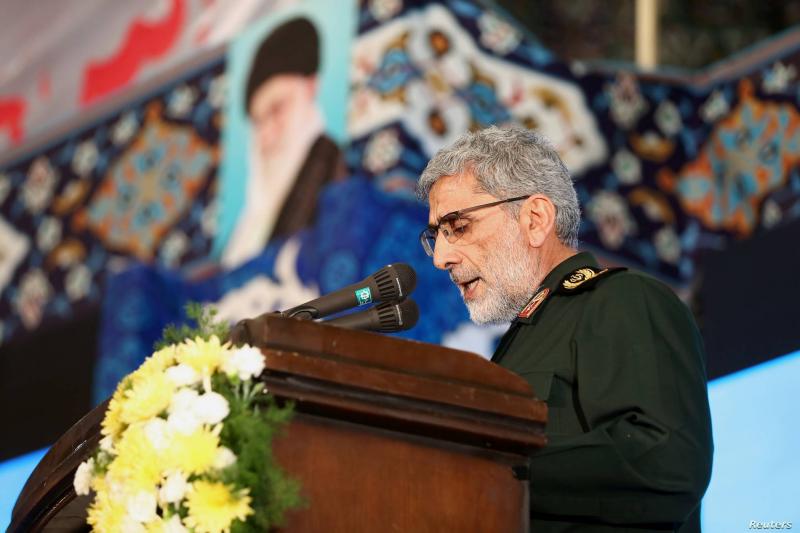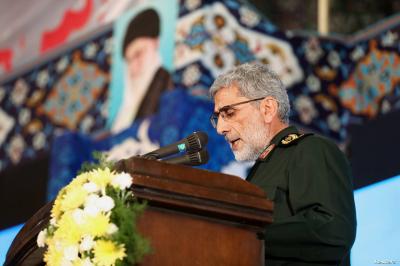Under the title "Qaani's Role in the Region: Doubts About His Abilities and Relationship with Khamenei," Al-Hurra reported a story from the Guardian newspaper, noting that since taking over from Qassem Soleimani as head of the Quds Force of the Iranian Revolutionary Guard, Ismail Qaani has practically become one of Iran's most powerful figures in the region, particularly in Iraq, Syria, and Lebanon, where Tehran supports armed militias connected to the Revolutionary Guard. However, Qaani appears to be keen not to present himself as the strong man that Soleimani was, and the opposite may indeed be true, according to an analysis published by the British newspaper. The analysis highlighted that Qaani has proven to be "very weak." The analysis by Martin Chulov, the newspaper's Middle East correspondent, stated that "Qaani was unable to fill the void left by the killing of Qassem Soleimani" in the Iraqi landscape.
In a meeting held last month in Baghdad attended by Iraqi militia leaders and Qaani, the analysis indicates that he was unable to convince the militias that it was not in their interest to continue launching rockets at the American embassy in the Green Zone or at Erbil Airport in northern Iraq, where American forces remain present. One attendee reportedly remarked, "All eyes were on him (Qaani) at first, but by the end of the meeting, everyone knew he was not the new Soleimani, for sure."
A report by the Associated Press at the beginning of this month indicated that "prominent pro-Iran militia leaders in Iraq refused to comply with Qaani's directives when he met with them in Baghdad last month and demanded they stand down until the completion of nuclear talks between Iran and the United States." Occasionally, Iran sends "veiled" messages attempting to indicate its non-responsibility for attacks carried out by allied militias against American interests in Iraq, according to observers who also linked this to the nuclear negotiation files between Tehran and the major powers.
The Guardian's analysis quoted a "senior Iraqi figure" commenting on his meeting with Qaani, saying, "He is not even a shadow of Soleimani; he is sincere, but he is learning through work," referencing Qaani's limited experience. Iranian political analyst Hussein Ruyaran stated that "the talk about Qaani lacking experience is unfounded, as he was Soleimani's deputy for a decade," adding that "if Khamenei did not trust Qaani, he would not have appointed him to this position in the first place." Regarding Qaani's inability to speak Arabic, as referenced in the Guardian analysis, Ruyaran mentioned in an interview with Al-Hurra that "Soleimani did not speak Arabic fluently either; he spoke it to a limited extent, so I do not think this is very significant."
Ruyaran emphasized that "the issue is not based on the individual competencies of a specific leader," but is instead "structural," noting that "the institution remains as it was." He questioned whether "you think Soleimani transported weapons to Gaza and Syria himself? No, this is not a leader's task but a task for the structure he oversees."
In the early hours of January 3, 2020, the United States brought the curtain down on Iran's foremost man in the region and the disruptive arm of the leader, Qassem Soleimani, the commander of the Quds Force, after he was killed in the Iraqi capital, Baghdad.
### Relationship with the Supreme Leader
The Guardian's analysis points out that "Qaani lacks a relationship with Iranian Supreme Leader Ali Khamenei, and does not possess – being a veteran in Afghanistan – experience in Iraq or Syria, nor does he speak Arabic." However, Mohammad Saleh Sadqian, director of the Arab Center for Iranian Studies, argues that describing Qaani as weak is "inaccurate," and that the claim regarding the absence of a relationship with the leader's office "is also inaccurate." Sadqiani bases his commentary on the fact that Qaani "enjoys the same resources and influence that Soleimani had as the head of the Quds Force," as he describes.
He added in an interview with Al-Hurra that "all the information that Qassem Soleimani had during his leadership of the Quds Force has been transferred to Qaani." He affirmed that "there are Iranian advisors who entered Iraq during Qassem Soleimani's tenure at the request of the Iraqi government, and the Quds Force's relationship with the Popular Mobilization Forces is coordinated through the General Command of the Armed Forces. Therefore, the presence of these advisors overseen by Quds Force Commander Ismail Qaani is for coordination between these advisors and the Iraqi Armed Forces."
Despite this, Sadqiani indicated that "Soleimani played roles in bringing the various Iraqi components together," during times such as the selection of the Prime Minister, a role "that any friend of Iraq can play," referring to Qaani.
### New Factions
A report published by Reuters last May noted that Iran "gathered hundreds of trusted fighters from among the ranks of its most powerful allied militias in Iraq to form smaller factions comprising elite elements, in a new tactic that reduces its dependence on the known militias it has worked with for years." The Reuters report indicated that Iran adopted this new tactic following setbacks it faced in Iraq recently, reflected in the decline in popularity of its allied militias due to protests against Iranian influence and the killing of Qassem Soleimani in an American strike at the beginning of 2020. Soleimani was killed in a US drone strike in early January 2020, which also resulted in the death of Abu Mahdi al-Muhandis, the commander of the Iraqi Popular Mobilization Forces and responsible for Iraqi militias, who was accompanying Soleimani in a convoy near Baghdad International Airport.




